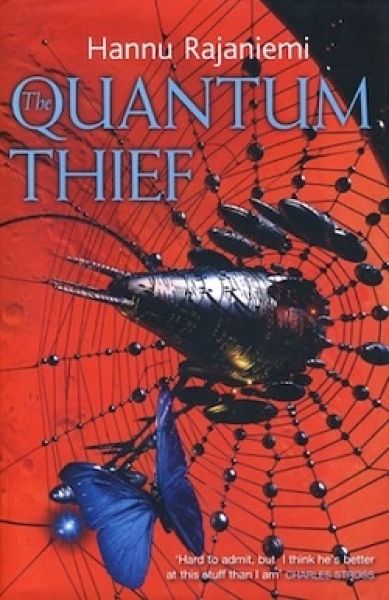Sleight Of Hand
The Quantum Thief (Jean le Flambeur, volume 1)
By Hannu Rajaniemi

10 Nov, 2022
2010’s The Quantum Thief is the first volume in Hannu Rajaniemi’s Jean le Flambeur science fiction series.
Jean le Flambeur is famous as a thief par excellence — famous across a quirky, post-human Solar System. As such, he has the right combination of audacity, skill, and luck to accomplish a daunting task for Mieli and her patron.
But … perhaps Jean falls slightly short on the luck front. After all, he is securely locked up in Dilemma Prison, from which escape is impossible. Cue one pre-caper caper.
Mieli manages to retrieve a copy of Jean’s mind from the prison. This iteration is presented with a simple choice: perform the tasks demanded of him or be returned to the particularly unpleasant sequence of Prisoner’s Dilemmas that is daily life in the prison. Jean of course agrees to the terms offered.
There is just one small catch, which is that Jean is not the man he used to be. Prior to capture, Jean hid vital portions of his mind around the Solar System. As he is, he lacks the skills needed. Therefore, cue another pre-caper caper, this one on Mars.
The Oubliette believe themselves to be successful revolutionaries, former slaves who overthrew their masters in a great revolution. Now everyone gets a chance at enjoying a life of ease or at least work they enjoy. They pay for this by submitting to periods spent in Quiet, with their gogols (copies of their minds) working as servants of the city. Citizens can opt to enter Quiet early or it can be imposed as a punishment.
Oubliette has an ongoing problem with criminals stealing noteworthy gogols for off-world masters. The tzaddick vigilantes struggle to contain the pirates, not to mention other criminals. Isadore is not technically a tzaddick but he has recently fallen into helping one, the Gentleman. Together they solve crimes!
Jean is ill advised to venture into Oubliette, where he could attract the attention of Isadore, the Gentleman, or characters even more threatening. If he is to retrieve the missing fragments of his mind, he has no choice.
~oOo~
This is one part Lupin pastiche to one part Holmes (or at least, that’s how I see it). If Holmes ever falls out of fashion, there will legions of readers baffled why a particular consulting detective trope appears in setting after setting. Obviously Arsène Lupin will remain a cultural touchstone.
This novel is only twelve years old but it reads like the product of a different era. Remember the Singularity? Nigh-godlike AIs were going to utterly transform society by 2023! Just as general semantics, social credit, and the end of history would utterly transform society. The important thing is never to learn from experience: always invest one’s total trust in proclamations of each new transformative trend.
Whether or not Hannu Rajaniemi bought into the Singularity is by the way. What matters is that Rajaniemi leaned into the narrative possibilities of the Singularity. This is a world where minds are as tradable as MP3 files, where identity is fuzzy, and where escape is both impossible and inevitable.
This could be very confusing. It is. Rajaniemi belongs to the John M. Ford school of exposition, which is that characters never muse on facts they know well and informative discourse only occurs when it would be in character. Just as your average detective novel spends very little time explaining how internal combustion engines work, so too does the author refrain from explaining the functioning of the futuristic commonplace. Readers will have to figure things out on the fly.
Early on, readers may find themselves wondering whether the prize is worth the effort or whether this should be a don’t‑bother-to-finish book. Press on! The events are going somewhere and characters and plot do pay off in the end [1].
The Quantum Thief is available here (Amazon US), here (Amazon Canada), here (Amazon UK), here (Barnes & Noble), here (Book Depository), and here (Chapters-Indigo).
1: I see from my notes that I read books one and two in the series, but not book three. Books one and two were selected for me by SFBC, but the third volume came out about the time James Nicoll Reviews began and I, uh, forgot to check it out. Oh, well. It’s not like my to-do list isn’t aleph null books long already.
